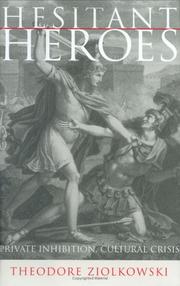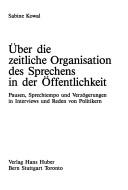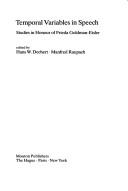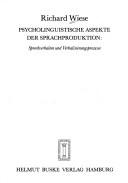| Listing 1 - 10 of 13 | << page >> |
Sort by
|
Book
ISBN: 9782889280070 2889280071 Year: 2016 Publisher: Paris: Diaphanes,
Abstract | Keywords | Export | Availability | Bookmark
 Loading...
Loading...Choose an application
- Reference Manager
- EndNote
- RefWorks (Direct export to RefWorks)
Book
ISBN: 0857427245 9780857427243 Year: 2019 Publisher: London: Seagull books,
Abstract | Keywords | Export | Availability | Bookmark
 Loading...
Loading...Choose an application
- Reference Manager
- EndNote
- RefWorks (Direct export to RefWorks)
Western culture has been marked by deep divisions between action and contemplation, intervention and passivity, and decisiveness and withdrawal. Conceived as radical opposites, these terms structure the history of religion, philosophy, and political theory, and have left their imprint on the most intimate processes of individual decision-making and geo-political strategies. But, inOn Tarrying, Joseph Vogl argues for a third way, a mode of thought that doesn't insist on these divisive either/ors. Neither an active refusal to engage with the world nor a consistent strategy of resistance, tarrying, as defined by Vogl, defers, multiplies, and suspends the strictures of decision-making.

ISBN: 150171127X 9781501711275 0801442036 9780801442032 Year: 2004
Abstract | Keywords | Export | Availability | Bookmark
 Loading...
Loading...Choose an application
- Reference Manager
- EndNote
- RefWorks (Direct export to RefWorks)
Why, Theodore Ziolkowski wonders, does Western literature abound with figures who experience a crucial moment of uncertainty in their actions? In this highly original and engaging work, he explores the significance of these unlikely heroes for literature and history.From Aeneas-who wavered momentarily before plunging his sword into Turnus's chest-to Hamlet, Orestes, Parzival, Wallenstein, and others, including Kafka's Josef K., Ziolkowski demonstrates that characters' private uncertainty reveals a classic opposition of binary forces. He describes how Aeneas, for example, was forced to choose between the ancient code of blood vengeance and the new civic virtues of law and justice. Ziolkowski asserts that the indecision of the characters reflects the tensions that authors observed in their own societies. Drawing on the insights of Hegel and Freud, he analyzes the ways in which these tensions represent turning points in cultural history. In stark contrast to Aeneas, Josef K. temporized for a year before his executioners thrust a knife into his heart. For Ziolkowski, the centuries separating Virgil and Kafka are ones in which the notion of the hero was transformed almost to the point of total inversion. He sheds light on this transformation and a corresponding change in literary form.
Hesitation in literature. --- Heroes in literature. --- Heroes in literature --- Hesitation in literature
Book
ISBN: 9782343196213 2343196214 Year: 2020 Publisher: Paris: L'Harmattan,
Abstract | Keywords | Export | Availability | Bookmark
 Loading...
Loading...Choose an application
- Reference Manager
- EndNote
- RefWorks (Direct export to RefWorks)
D'un point de vue purement formel, une séquence de parole peut être décrite comme des successions de sons entrecoupées par des phases silencieuses. Si les différentes branches qui constituent les sciences du langage se sont largement appliquées à décrire ces séquences sonores par rapport à leurs traits phonétiques, à leur rôle sémantique ou à la façon dont ces différents éléments s'agencent les uns avec les autres, les pauses silencieuses ont donné lieu à un nombre d'études plus limité. Ce manque de travaux sur les pauses est d'autant plus dommageable que celles-ci présentent un caractère essentiel en parole et en discours. Cet ouvrage propose des recherches originales réalisées à partir de terrains sur lesquels les interruptions du signal de parole n'ont donné lieu qu'à peu de recherches.
Hésitation (linguistique) --- Analyse de la conversation --- Communication orale --- Pragmatics

ISBN: 3456820577 Year: 1991 Publisher: Bern Huber
Abstract | Keywords | Export | Availability | Bookmark
 Loading...
Loading...Choose an application
- Reference Manager
- EndNote
- RefWorks (Direct export to RefWorks)
Hesitation form (Linguistics) --- Juncture (Linguistics) --- Language and languages --- Political oratory --- Psycholinguistics --- Speech errors --- Tempo (Phonetics) --- Rhythm
Book
ISBN: 0822988011 9780822988014 0822946556 9780822946557 9780822966906 0822966905 Year: 2021 Publisher: Pittsburgh, Pa.: University of Pittsburgh Press,
Abstract | Keywords | Export | Availability | Bookmark
 Loading...
Loading...Choose an application
- Reference Manager
- EndNote
- RefWorks (Direct export to RefWorks)
"The public has voiced concern over the adverse effects of vaccines from the moment Dr. Edward Jenner introduced the first smallpox vaccine in 1796. The controversy over childhood immunization intensified in 1998, when Dr. Andrew Wakefield linked the MMR vaccine to autism. Although Wakefield's findings were later discredited and retracted, and medical and scientific evidence suggests routine immunizations have significantly reduced life-threatening conditions like measles, whooping cough, and polio, vaccine refusal and vaccine-preventable outbreaks are on the rise. This book explores vaccine hesitancy and refusal among parents in the industrialized North. Although biomedical, public health, and popular science literature has focused on a scientifically ignorant public, the real problem, Maya J. Goldenberg argues, lies not in misunderstanding, but in mistrust. Public confidence in scientific institutions and government bodies has been shaken by fraud, research scandals, and misconduct. Her book reveals how vaccine studies sponsored by the pharmaceutical industry, compelling rhetorics from the anti-vaccine movement, and the spread of populist knowledge on social media have all contributed to a public mistrust of the scientific consensus. Importantly, it also emphasizes how historical and current discrimination in health care against marginalized communities continues to shape public perception of institutional trustworthiness. Goldenberg ultimately reframes vaccine hesitancy as a crisis of public trust rather than a war on science, arguing that having good scientific support of vaccine efficacy and safety is not enough. In a fraught communications landscape, Vaccine Hesitancy advocates for trust-building measures that focus on relationships, transparency, and justice"--
Hesitation. --- Vaccination --- Vaccines --- Vaccines. --- Complications. --- Social aspects. --- adverse effects. --- Vaccine --- Biologicals --- Hesitancy --- Psychology --- Complications and sequelae --- Side effects --- Vaccines - Social aspects --- Vaccination - Complications --- Hesitation --- Impfung --- Impfstoff --- Nebenwirkung --- Patienteninformation --- Skepsis
Dissertation
Year: 2023 Publisher: Liège Université de Liège (ULiège)
Abstract | Keywords | Export | Availability | Bookmark
 Loading...
Loading...Choose an application
- Reference Manager
- EndNote
- RefWorks (Direct export to RefWorks)
Introduction : Malgré les recommandations de l’OMS, la réticence à la vaccination antigrippale est en augmentation chez les travailleurs de la santé (TS) en Europe (1) et la couverture vaccinale reste sous-optimale (2,3). Les TS sont des vecteurs potentiels du virus de la grippe et les patients onco-hématologiques sont particulièrement à risque. Nous avons mené une recherche, au sein de l’hôpital de la Citadelle de Liège, afin d’explorer les déterminants à l’acceptation, à l’hésitation et au refus vaccinal des TS en contact direct avec les patients fragilisés par une pathologie onco-hématologique. Matériels et méthodes : Étude transversale, quantitative et déductive, menée auprès de l’ensemble des TS des 7 services s’occupant prioritairement des patients onco-hématologiques. Un questionnaire a été élaboré spécifiquement pour cette étude selon un modèle théorique hybride (modèles SAGE WG et 5C). Ce questionnaire auto-administré a été récolté du 5 au 29/09/2022. Les analyses statistiques ont été réalisées à l’aide du logiciel R. Résultats : Parmi les 152 TS éligibles, 100 ont répondu au questionnaire (Taux de réponse = 65,8 %). Cinquante-cinq pourcents des TS ont déclaré avoir été vaccinés contre la grippe en 2021-22. Les analyses statistiques ont montré qu’un niveau élevé de connaissances (sur la grippe et le vaccin) et les antécédents de vaccination étaient des facteurs prédictifs à l’acceptation vaccinale (p<0,001). Les principales raisons à l’acceptation vaccinale concernaient prioritairement la protection des patients à plus de 96%, venaient ensuite la gratuité (85,2%), l’accessibilité (83,6%), la protection de l’entourage (83,6%) et l’autoprotection (81,8%). Le caractère non obligatoire de la vaccination était pour les 45% des TS non-vaccinés le motif principal au refus vaccinal (86,7%). D’autres freins fréquemment retrouvés étaient la préférence pour l’immunisation naturelle (63,6%), la peur de contracter la grippe avec le vaccin (53,3%), ne pas faire partie des groupes à risque (52,3%), la crainte des effets secondaires du vaccin (48,9%) et se sentir en bonne santé (48,8%).

ISBN: 9027979464 3110816571 9783110816570 9789027979469 Year: 1980 Volume: 86 Publisher: The Hague: Mouton,
Abstract | Keywords | Export | Availability | Bookmark
 Loading...
Loading...Choose an application
- Reference Manager
- EndNote
- RefWorks (Direct export to RefWorks)
No detailed description available for "Temporal Variables in Speech".
Juncture (Linguistics) --- Speech errors --- Hesitation form (Linguistics) --- Lapsus linguae --- Eisler, Frieda Goldman --- 159.9:800 --- Slips of the tongue --- Speech lapse --- Errors --- Psycholinguistics --- Speech --- Pause (Linguistics) --- Transition (Linguistics) --- Grammar, Comparative and general --- Linguistics --- Prosodic analysis (Linguistics) --- Psycholinguistiek --- Phonology --- Goldman-Eisler, Frieda --- Festschrift - Libri Amicorum --- Speech errors. --- Eisler, Frieda Goldman. --- 159.9:800 Psycholinguistiek --- Hesitation form (Linguistics). --- Juncture (Linguistics).
Dissertation

Year: 2019 Publisher: Liège Université de Liège (ULiège)
Abstract | Keywords | Export | Availability | Bookmark
 Loading...
Loading...Choose an application
- Reference Manager
- EndNote
- RefWorks (Direct export to RefWorks)
Introduction : L’étude de l’hésitation vaccinale est en plein essor. Et pour cause, le taux de parents hésitants est en augmentation : cela se manifeste par une diminution du taux de vaccination dans certaines régions. La communication des professionnels de la santé est un facteur qui peut influencer ces parents. Cependant, certains professionnels ne se sentent pas toujours capables de répondre et de communiquer adéquatement avec ceux-ci. Mais qu’en est-il réellement en Belgique? Objectifs : Comprendre les difficultés rencontrées par des PDS dans la discussion vaccinale avec des parents hésitants à travers un support portant sur la communication. Et, ainsi, disposer d’une base de données de façon à proposer des solutions adéquates. Méthodologie : Une étude mixte est réalisée avec 29 professionnels de la santé (généralistes, pédiatres, infirmières et assistantes-sociales), recrutés dans les consultations de 0 à 6 ans de l’Office de la Naissance et de l’Enfance des divisions de Liège et Verviers. Un entretien est réalisé après utilisation du support durant 2 mois et 3 questionnaires sont remplis par les professionnels dans le courant de l’étude. Résultats : Les caractéristiques des parents hésitants, bien qu’hétérogènes, correspondent à celles présentes dans la littérature. En ce qui concerne les professionnels de l’ONE, ils partagent une certaine frustration, accompagnée par un manque de temps, face à des parents hésitants. Des disparités importantes entre les formations des professionnels ont été observées et celles-ci ne facilitent pas la discussion vaccinale. De plus, un besoin de connaissances et d’accès à l’information, voire même l’hésitation des professionnels euxmêmes, sont un obstacle à cette discussion. Conclusion : Des besoins de connaissances sur la vaccination et de formations sur la communication ainsi que des attentes de supports à utiliser avec les parents ont été identifiés. Le support, bien que jugé intéressant, nécessite des modifications et n’est pas suffisant à lui seul pour avoir un impact sur la communication des professionnels. Introduction: The study of vaccine hesitancy is expanding. The allocated cause would be the increasing rate of hesitant parent: this is shown through a decrease in the rate of vaccination in certain regions. The communication of healthcare workers is a factor that can influence those parents. However some professionals do not always feel competent to address parents efficiently no to communicate properly with them. But how does this really go in Belgium? Objectives: To understand the difficulties met by the HCWs in the vaccine discussion with hesitant parents through a support about communication. Thus, having a database that offers them adequate solutions. Methodology: A mix study placed amongst 29 healthcare workers (general practitioners, pediatricians, nurses and social workers) recruited in consultations of 0 to 6 year olds in the “Office de la naissance et de l’enfance” (ONE) in the departments of Liege and Verviers. An interview is arranged after using the support for 2 months and 3 questionnaires are filled by the professionals in the length time of the study. Results: The traits of hesitant parents, although heterogeneous, match those available in literature. Regarding the professionals of ONE, they share some frustration, mixed with a lack of time, facing hesitant parents. Some substantial discrepancies amongst the training of said professionals have been pointed out and do not facilitate the vaccine discussion. Moreover, a need for more knowledge and for access to more information, and even the own hesitancy of the professional, are hurdles to this discussion. Conclusion: Needs for knowledge on vaccines and training on communication along with expectations of tools to use with the parents have been identified. The support, although judged interesting, needs some upgrades and is not sufficient on its own to impact positively the communication of the professionals.
hésitation vaccinale --- professionnels de la santé --- communication --- support --- formation --- vaccine hesitancy --- health care worker --- communication --- tools --- training --- Sciences de la santé humaine > Santé publique, services médicaux & soins de santé

ISBN: 3871186252 9783871186257 Year: 1983 Volume: 44 44 Publisher: Hamburg: Buske,
Abstract | Keywords | Export | Availability | Bookmark
 Loading...
Loading...Choose an application
- Reference Manager
- EndNote
- RefWorks (Direct export to RefWorks)
Psycholinguistics --- Juncture (Linguistics) --- Hesitation form (Linguistics) --- Speech errors --- Lapsus linguae --- Slips of the tongue --- Speech lapse --- Errors --- Speech --- Linguistics --- Pause (Linguistics) --- Transition (Linguistics) --- Grammar, Comparative and general --- Prosodic analysis (Linguistics) --- Language, Psychology of --- Language and languages --- Psychology of language --- Psychology --- Thought and thinking --- Phonology --- Psychological aspects
| Listing 1 - 10 of 13 | << page >> |
Sort by
|

 Search
Search Feedback
Feedback About UniCat
About UniCat  Help
Help News
News